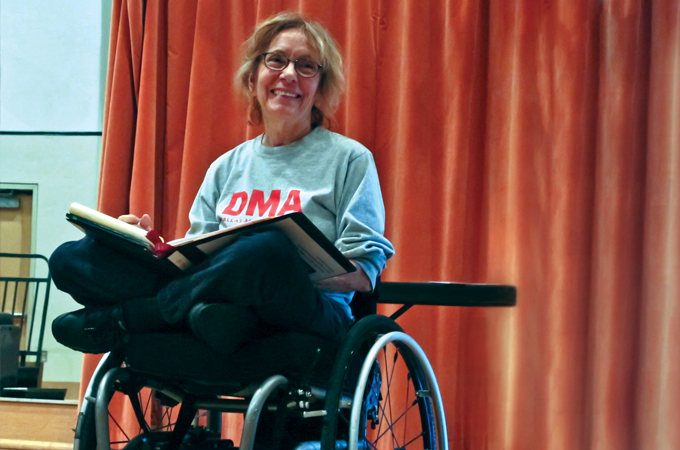University of Redlands Theatre Professor Victoria Lewis is a massive fan of the musical Hamilton.
And it’s not just because of Lin-Manuel Miranda’s musical stylings or his clever retelling of history. Lewis says Hamilton’s impact has ricocheted from the stage to the classroom and has helped her teach theatre history to her current students.
“Hamilton was remarkable in that it told the story of the founding of America through a cast of people who live in America now,” Lewis says. “It reset what could happen on the American stage. Hamilton didn’t come out of nowhere; it was another step in a continuing fight for equity in the American theatre in terms of policies, union action, and creative practice. Casting more often than not was a flashpoint for those reform efforts. It was casting that gave Hamilton the engine for its fabulous music, choreography, and lyrics.”
As someone who has been part of the struggle for equity in theatre from the beginning of her career, Lewis says casting is a political act that can be unpacked to expose systemic exclusion and discrimination in education and employment for marginalized artists.
That’s the subject of her essay, “A Great and Complicated Thing: Reimagining Disability,” part of the book Casting a Movement: The Welcome Table Initiative (2019). Lewis joins other actors, directors, educators, playwrights, and scholars in exploring casting in American theatre. The book’s contributors are working artists and scholars from multiple American experiences: African American, Native American, Arab-American, Latinx, and deaf and disabled theatre artists who are seeking to dismantle systemic racism, sexism, homophobia, classism, and ableism on the American stage. She says, “The book’s title, ‘The Welcome Table’ [refers to] making room for people who have been marginalized, and not have had a place in the power structures that govern American theatre.”
Lewis knows firsthand about being marginalized. Although she had been acting and performing since she was 5 years old, a distinguished New York City theatre program refused to admit her in the 1970s because her disability (post-polio) meant “I would never work anyway.”
They were wrong: Lewis went on to have an acting career. Since the 1980s, she has worked on various performance platforms, from community-based theatre (Lilith, A Women’s Theatre in San Francisco, and Family Circus Theatre in Portland, Oregon) to professional theatre (Old Globe in San Diego and the Mark Taper Forum in Los Angeles) and television. A role in the soap opera Knots Landing was “the only job that caught my family’s attention,” she says. “Wow, TV!”
In the early 1980s Lewis was awarded a three-year Artist in Residence grant from the California Arts Council for a theatre workshop for disabled women at the Taper. Those three years turned into a 20-year position as member of the Taper’s artistic staff. There she founded the Other Voices Project, developing documentary plays with blue-collar workers, teen mothers in South Central Los Angeles, and the disability community. Working alongside the directors of the Taper’s Asian-American Theatre Workshop, the Latino Theatre Initiative, and Blacksmyths, she was part of a movement in American theatre to change who gets to tell their stories. Significantly, Other Voices provided a creative home for many disabled playwrights and actors now working nationally.
In her essay, Lewis looks back on her work in the disability arts movement and emphasizes the need to create plays that portray disabled people as complex beings, instead of relying on disability tropes. “In my work, I often start with the British slogan ‘Piss on Pity.’ That wakes people up! The point is pity—feeling sorry for someone—is the opposite of respect,” she says. “Pity sets up a relation that infantilizes the disabled person. Cue Lady Bountiful dispensing charity to the poor unfortunates.”
Lewis joined the Redlands community shortly after earning her Ph.D. in theatre at University of California, Los Angeles in 2000. Hired as a generalist, she has taught Acting, Theatre History, Theatre for Social Change, Diversity on the American Stage, and Documentary Theatre and has directed several comedies dealing with social issues.
Whatever the class or project at Redlands, Lewis says she and her students share transformative experiences. One of the most consistent is the discovery of the disability rights movement and disability history. “They no longer see disabled people as the pitiful other, but they see them as equals.”
It also helps that Redlands has small classes. In the Theatre Department, she says, “each student gets a chance to explore who they are and what they can be, and grow because of strong faculty mentoring.”
It’s also in theatre—the most social of art forms—where students realize just how important casting is. “The stories where you see people who look and act like you are how you begin to believe that you can move beyond your circumstances,” she says. “If you’re not allowed in the casting room, or in the training institution, or to be in conversation with other artists, you won’t be on the stage or screen. Then another generation of disabled or deaf aspiring artists, along with many others from underrepresented communities, will take a pass on a career in the arts. The message they get is clear: It’s not an equal playing field.”
Learn more about U of R’s Department of Theatre Arts.






